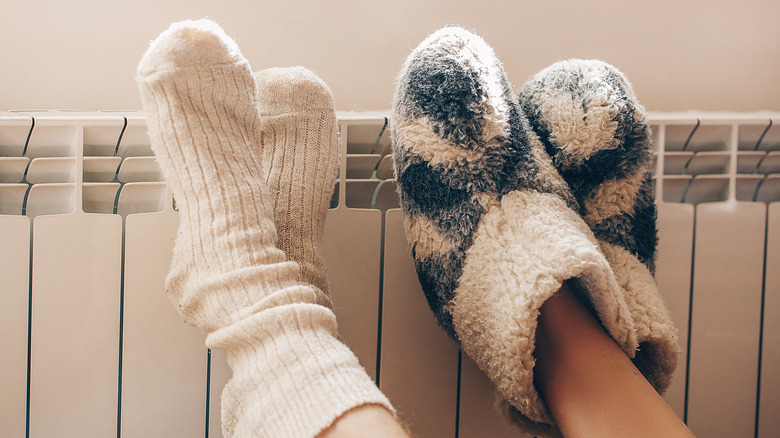Why You Might Not Be Drinking Enough Water In The Winter
Of all the things essential to our survival, water sits towards the top of the list. Our bodies are comprised of 60% water, with the brain and heart made up of 73% water (via USGS). With water being so critical to the function of our vital organs, how much water should we be drinking per day?
The U.S. National Academies of Sciences, Engineering, and Medicine advises men consume 15.5 cups of fluid per day, and that women should aim for 11.5 cups daily in order to stay adequately hydrated (via Mayo Clinic). While sufficient as a general guideline, one's daily fluid intake will vary based on factors such as climate, activity level, and health status. Adequate fluid intake is crucial in order to replenish the water lost through sweat, urine, and human waste. Additionally, water also performs a number of other functions including saliva production, joint lubrication, nourishing cells, and absorbing blunt shock around the brain and spinal cord, according to USGS.
Our bodies frequently remind us to drink water during the summertime, as the heat of the sun and rising temperatures often prompt our thirst. But do we need to drink as much water during the winter as we do during the summer?
Signs of wintertime dehydration
While you may not be profusely sweating in the same way you might be during the spring or summer months, adequate hydration during the winter is equally as important — though the signs of dehydration may be a little trickier to detect. Registered dietitian Julie Metos at the University of Utah explains, stating, "You're still perspiring, and you still need to feel alert. What I've learned lately is if you're even just a little bit dehydrated, your mental health or the way that you function can be impaired" (via University of Utah).
Metos goes on to say that another sign of winter dehydration can be grogginess, citing water as the boost of energy you may be looking for. "It's [that] 2:00 or 3:00 time in the afternoon where you're, like, 'Geez, I want to go home and take a nap.' Maybe if you go have a big glass of water, you might just have a little pick-me-up," she states.
What causes water loss during the winter?
When it comes to winter-specific sources of dehydration, central heating may be the culprit (via American Heart Association). Stavros Kavouras, director of the Hydration Science Lab at Arizona State University in Phoenix, explains how breathing in dry air in our homes prompts additional water loss. So while hot air will increase water loss, so, it turns out, does cold air. Joseph C. Watso, a postdoctoral research fellow at the Institute for Exercise and Environmental Medicine in Dallas, says that our kidneys actually work to increase our urine output when in colder environments — such as during the winter.
Watso attributes a lack of obvious thirst symptoms as the reason why some people may not be getting enough wintertime water, stating, "If you're not sweating, you might forget to drink adequate water" (via American Heart Association). For this reason, it's important to ensure we're meeting our daily water intake needs.



